As a registered dietitian who specializes in child and family nutrition, this is a question I’m asked a lot! I’m asked all the time by expectant and new moms if it’s safe to drink coffee and consume caffeine during pregnancy. The answer is yes–in moderation, however. Let’s take a look at the most up-to-date research…
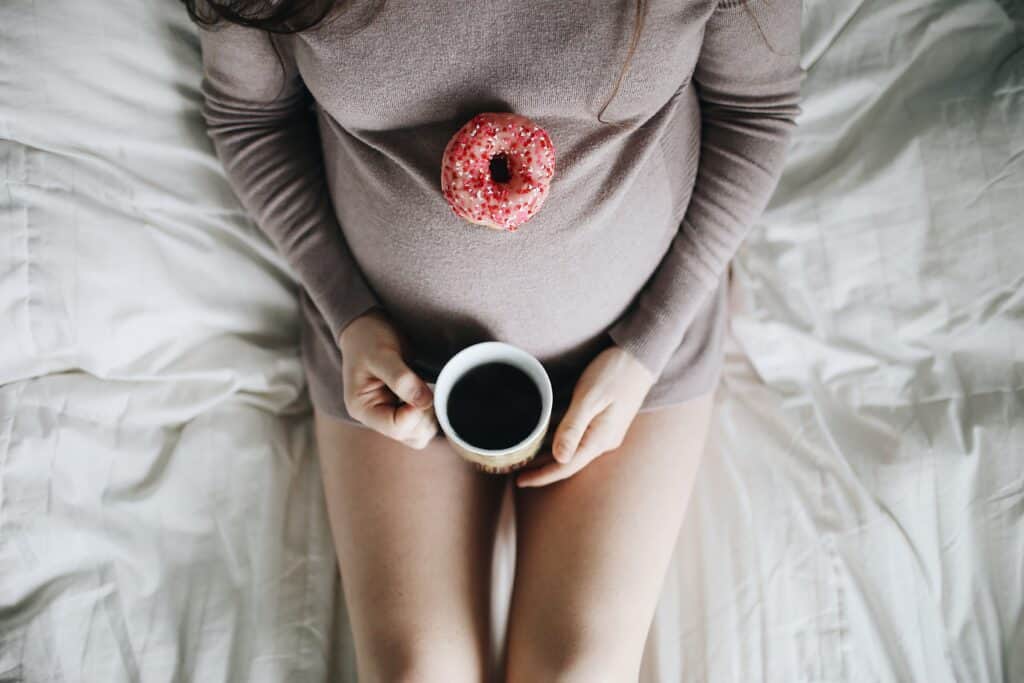
Caffeine is the most widely consumed psychoactive substance throughout the world. The majority of pregnant women continue to consume caffeine during pregnancy, if they were before. Maternal caffeine consumption and pregnancy outcomes have been studied for many years, however there is still much we don’t know (gotta love science!). Part of the reason is that most of the studies come along with inherent biases that are very hard, if not impossible to correct for. There is definitely a need for higher quality studies (double blinded randomized control trials) to determine what effects caffeine might have on pregnancy outcomes. Until then, we’ll give you the most up-to-date recommendations based on the newest research.
You’ll hear contradicting advice on this subject from various health experts and even non-health experts. Health Canada and Dietitians of Canada suggest that up to 300 mg of caffeine is safe during pregnancy, and then others like the American Pregnancy Association recommend to avoid it all together if possible. I recommend that pregnant women limit their caffeine intake to equal or less than 200 mg per day, which is the equivalent of about one and a half 8 oz cups of coffee/day. Keep in mind though that certain teas, soft drinks and foods also contain caffeine.
Here is a list that you can refer to if you’re wondering about caffeine levels in foods and beverages that you consume:
Caffeine content in common foods and beverages:
(Source: Health Canada)
- Brewed coffee 8 oz (237 mL)–> 135 mg caffeine
- Roasted, ground percolates 8 oz (237 mL)–> 118 mg caffeine
- Roasted, ground, filter drip 8 oz (237 mL)–> 179 mg
- Roasted and ground, decaf 8 oz (237 mL)–> 3mg caffeine
- Instant 8 oz (237 mL)–> 76-106 mg
- Instant decaf 8 oz *237 mL)–> 5 mg
- Black Tea (average blend) 8 oz (237 mL)–> 42 mg
- Green tea, 8 oz (237 mL)–>30 mg
- Decaf tea, 8oz (237 mL)–> 0 mg
- Regular Cola, 12 oz (355 mL)–> 36-46 mg
- Diet Cola, 12 oz (355 mL) –> 39-50 mg
- Chocolate milk, 8 oz (237 ml)–> 8 mg
- 1 envelope of hot cocoa mix, 8oz (237 mL)–> 5mg
- Milk Chocolate (1 oz or 28g)–> 7 mg
- Dark or baking chocolate (1 oz or 28g)–> 25-58 mg
- Chocolate cake (2.8 oz or 80g)–> 36 mg
- Chocolate Brownies (1.5oz or 42g)–> 10 mg
- Chocolate Mouse (3.2 oz or 90 g)–> 15 mg
- Chocolate Pudding (5.1 oz or 145 g)–> 9mg
So, what can ~200mg of caffeine look like in a day?
| EXAMPLE A | EXAMPLE B | EXAMPLE C |
| 1.5 cups of Brewed coffee | 2 cups of Green or Black Tea 1 oz. of dark chocolate | Double shot espresso latte |
Keep in mind that caffeine can also come from non-food sources such as pain medications, and supplements like pre-workout powders or weight loss supplements (which you should definitely not be consuming during pregnancy!),

Side effects of over-consumption include
- irritability
- headaches
- dehydration
- nervousness
- sleep disturbance
- rapid heart rate
- stomach upset, and more
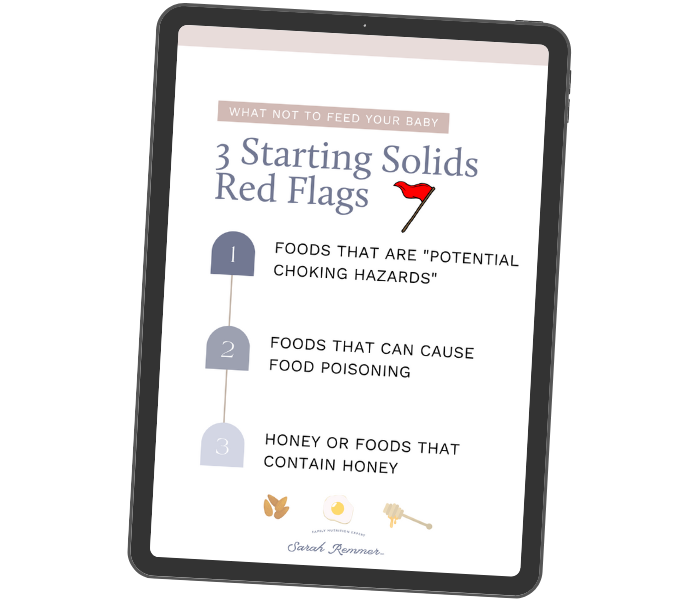
Starting solids? Don’t panic.
Starting solids is an exciting milestone in your baby’s life, but it can also be confusing, especially when you’re overloaded with conflicting information on how and when to do it. Download your free guide to starting solids and clear the confusion!
Can consuming caffeine lead to miscarriage or other adverse birth outcomes?
If you are consuming less than 1.5 cups of coffee or less than 200mg of caffeine each day, studies suggest that you are not at a heightened risk for miscarriage or other adverse outcomes such as low birth weight. But while enjoying your coffee and chocolate, keep in mind that caffeine is a stimulant and does cross the placenta/uterine barrier. Caffeine is metabolized slower in pregnancy as well, and genetics and certain environmental factors may impact your pregnancy outcome in relation to caffeine consumption. Over-consumption of caffeine (over about 500 mg per day) has been associated with miscarriage and as well as low birth weight in some studies.
Can consuming caffeine cause infertility?
No, consuming caffeine does not cause infertility. However, an excessive caffeine intake (more than 5 cups of coffee) has been associated with lower fertility. With current evidence, a moderate to low caffeine intake (less than 2 cups of coffee) does not appear to impact fertility.
Can I drink coffee while breast feeding?
Yes! The general consensus is that 2-3 cups of coffee while breastfeeding is acceptable. Small amounts of caffeine do pass into the breastmilk, so it’s a good idea to be aware of any behaviour changes in your baby. Some babies are more sensitive to caffeine than others and may seem fussier or have a harder time staying asleep. If you find this, you can experiment with cutting back on caffeine consumption to see if it helps!
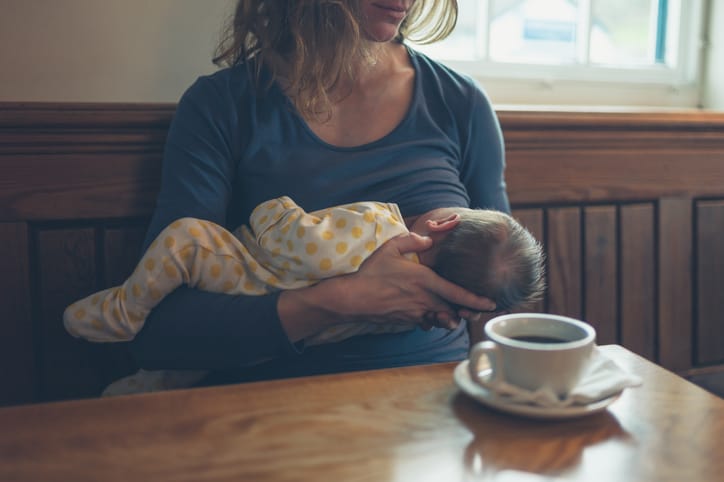
How can I kick the caffeine habit?
If you are a coffee lover like me, but plan to cut back during pregnancy, don’t quit cold turkey— you may experience withdrawal symptoms such as headaches. Instead, gently and slowly decrease your caffeine consumption over several days or weeks. Remember, including one, to one and a half cups of coffee a day is likely completely safe for you and your baby if you are already a coffee drinker. Obviously, I would not recommend starting to drink coffee during pregnancy if you did not previously.
The other most common questions I get asked about pregnancy?
- What do I look for in a prenatal multivitamin?
- What are the most important nutrients for a healthy pregnancy?
- How much weight gain is okay in pregnancy?
- What if I’m not gaining enough weight in my pregnancy?
- Are there any foods I should avoid during pregnancy?
Did you know that we provide one on one nutrition counselling services for families? If this is something you’d like to learn more about, check out our The Centre For Family Nutrition page.
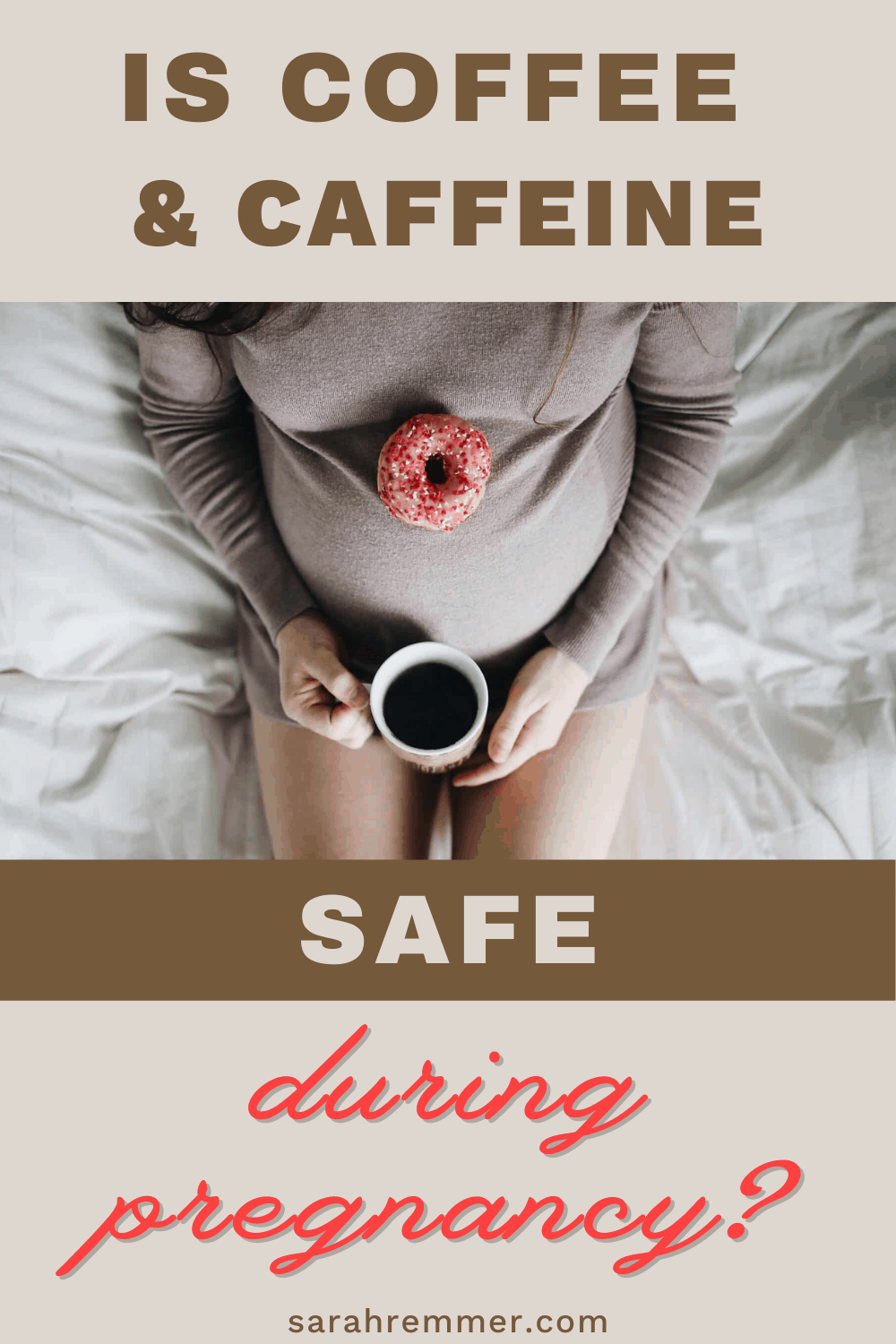
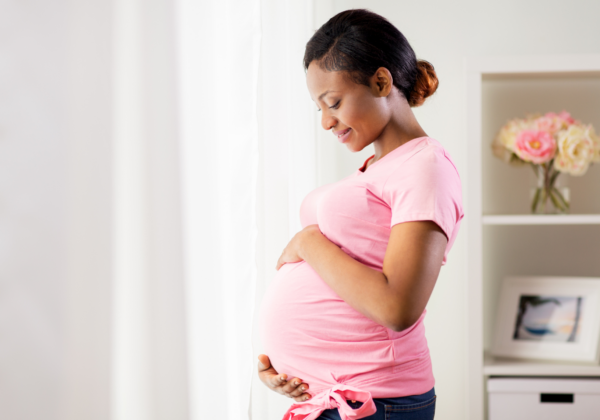
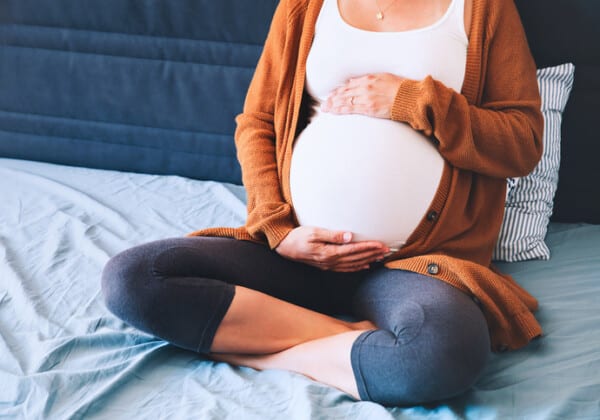
![[AD] It’s Day 6 of my 15-Minute Supper Series and today we’re putting a delicious twist on a classic BLT to make it nourishing and meal-worthy 🤤
Make sure to comment “Spud” and I’ll send you my top dietitian tips for feeding your family on busy weeknights along with a huge list of meal ideas!
This pasta salad takes no time at all to throw together and has everything you need for a nourishing meal. I always make extra bacon for things like this, but if you don’t have any cooked bacon I find cooking it in the airfryer or stovetop the quickest 🥓
I find that this salad lasts 2-3 days in the fridge without getting too soggy. You can also add in fresh lettuce to crisp it up or add the dressing when you eat it.
I ordered all of my groceries from @spuddelivers, which always saves me time and effort and gives me peace of mind knowing that I’m using high-quality, local and sustainable ingredients. I love that they come straight to my door the day after ordering 🙌🏻
Let’s make it!
Ingredients:
* 10 slices bacon cooked and diced
* 12 ounces pasta cooked and cooled
* 1 cup homemade Ranch dressing
* 1 ½ cup baby tomatoes diced
* ½ avocado diced
* feta
* ⅓ cup red onion diced
* 1 cup romaine lettuce
* fresh parsley for garnish optional
Homemade ranch dressing:
* ¾ cup mayonnaise
* ½ cup sour cream or Greek yogurt
* ½ teaspoon dried chives
* ½ teaspoon dried parsley
* ½ teaspoon dried dill weed
* ¼ teaspoon garlic powder
* ¼ teaspoon onion powder
* Salt and pepper to taste
Make it:
1. Blend all Ranch dressing ingredients together in a small blender (or whisk by hand) and set aside.
2. In a large bowl assemble the pasta, tomatoes, avocado, cheese, red onion, lettuce and bacon.
3. Pour the dressing over and toss to combine.
4. Garnish with parsley and serve.
You are going to LOVE this meal-worthy salad, I promise!
Comment SPUD to receive my top dietitian-approved tips for feeding your family during the week, a long list of ideas, and a curated shopping list with all of the ingredients for this recipe + all of the other ideas that I share in this resource!
#sponsored #spuddelivers #15minutemeals #whatsfordinner #easymealideas #dietitianapproved](https://www.sarahremmer.com/wp-content/uploads/sb-instagram-feed-images/438745920_798281295514125_2547899647147267180_nfull.jpg)





Leave a Comment